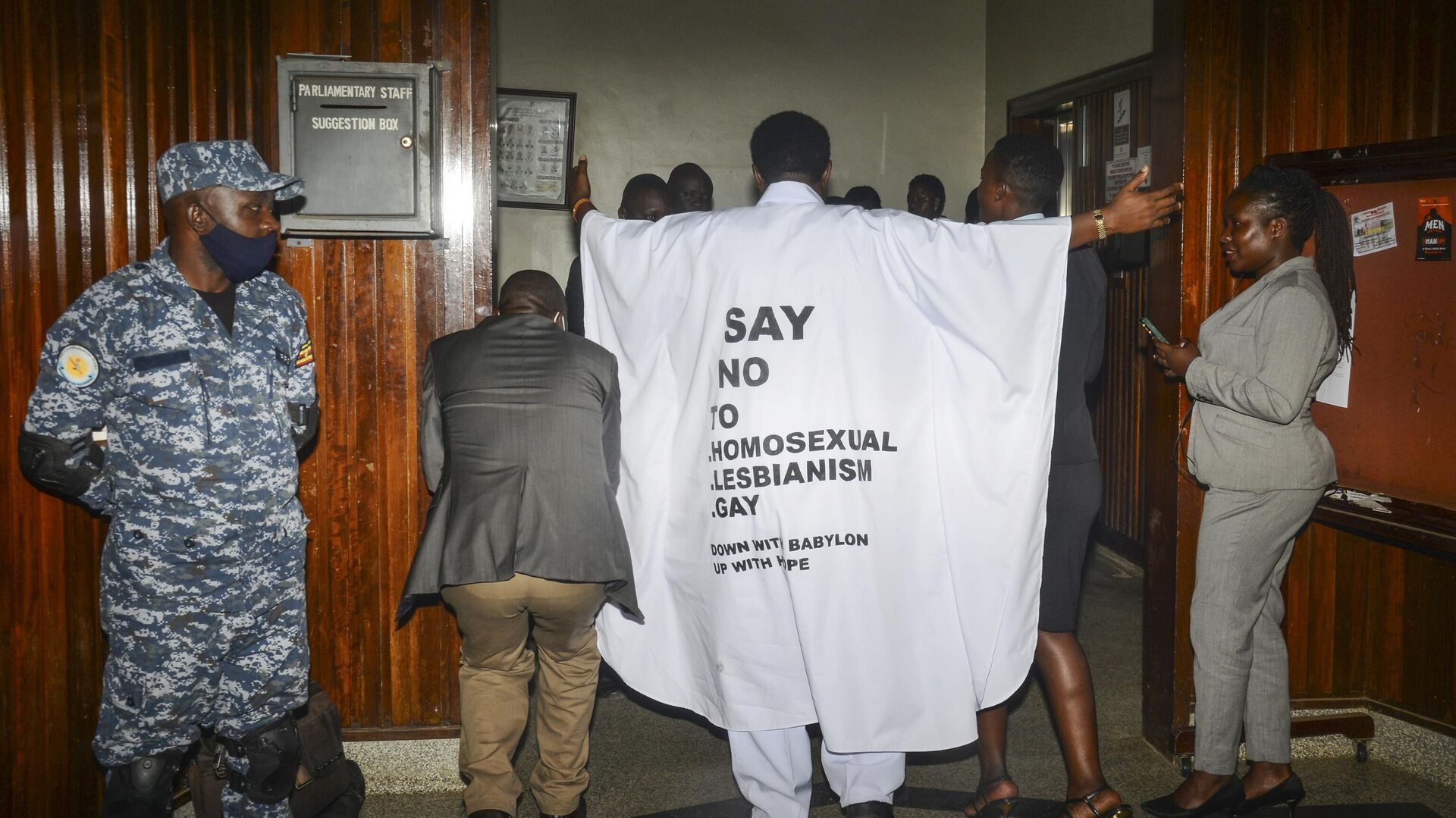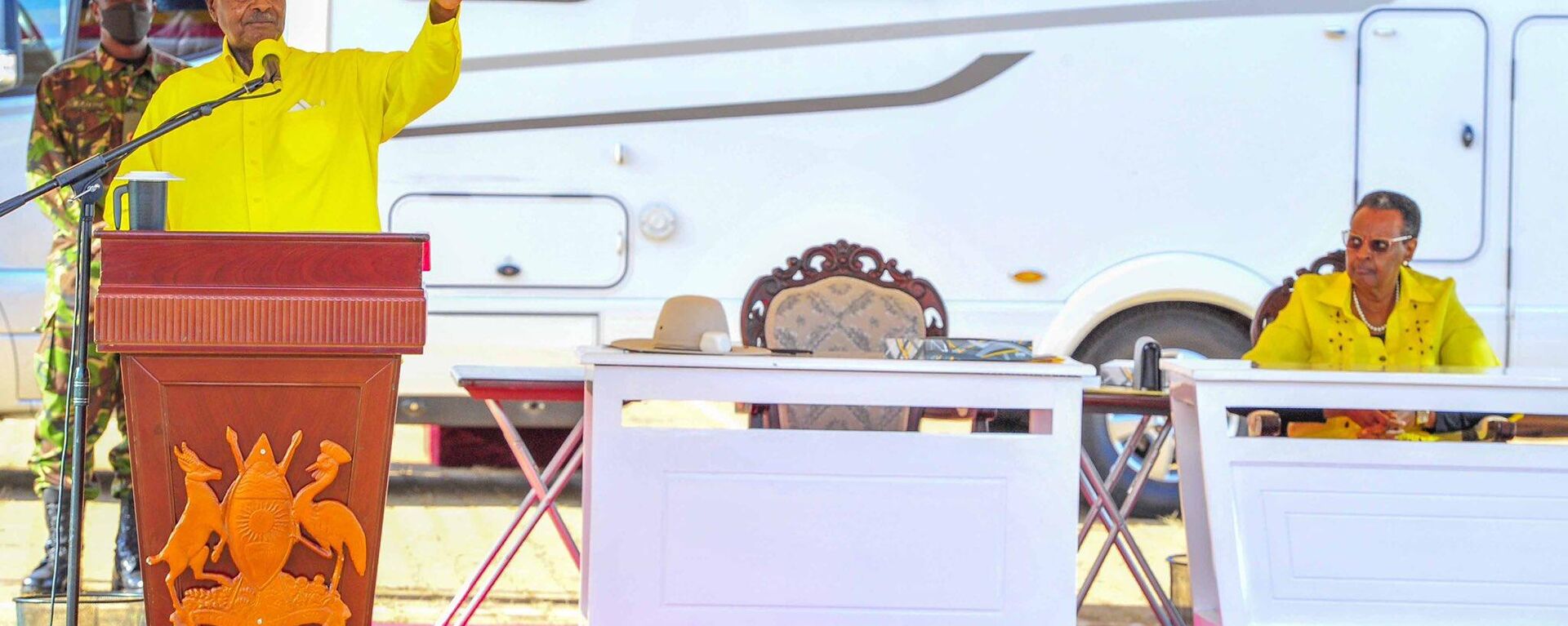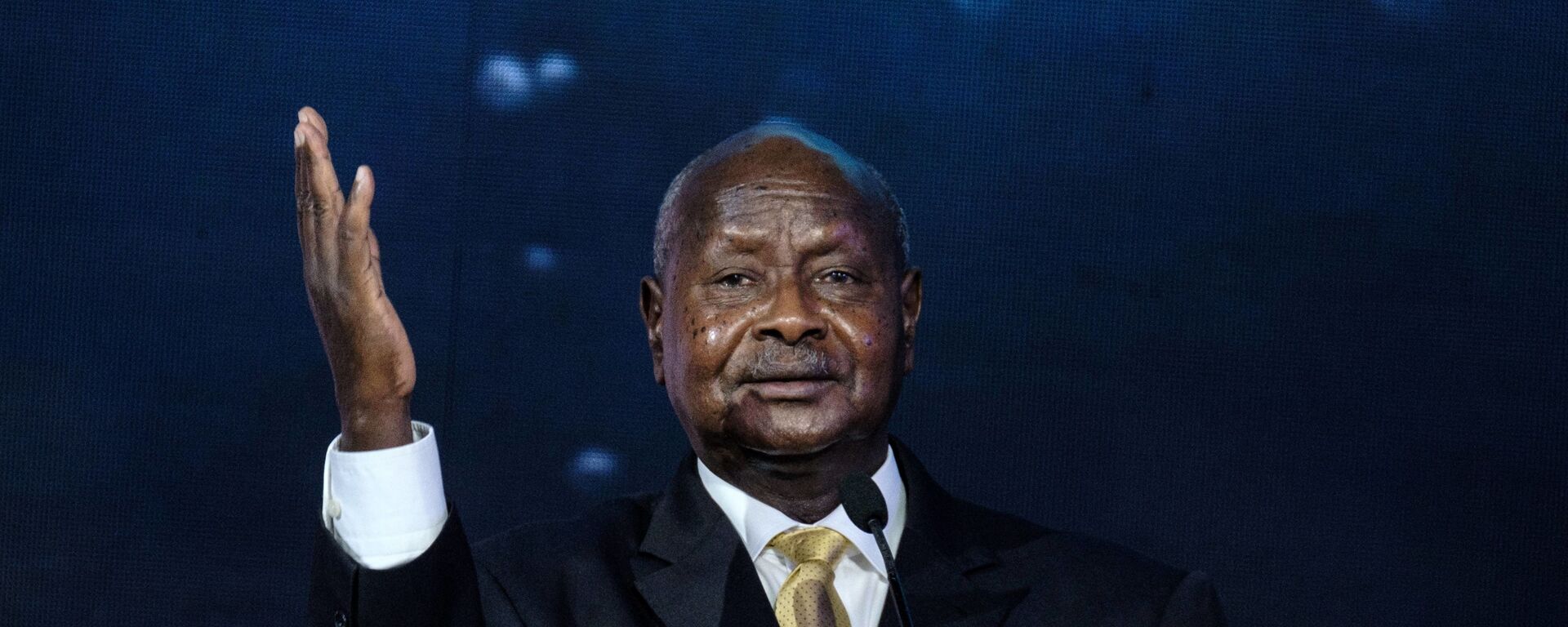https://en.sputniknews.africa/20230603/a-popular-law-author-of-ugandas-anti-lgbtq-law-explains-it-to-sputnik-1059686954.html
'A Popular Law': Author of Uganda's Anti-LGBTQ Law Explains It to Sputnik
'A Popular Law': Author of Uganda's Anti-LGBTQ Law Explains It to Sputnik
Sputnik Africa
Following the recent signing of Uganda's 2023 Anti-Homosexuality Bill by President Yoweri Museveni, Ugandan MP Asuman Basalirwa, who introduced the bill, explained its purpose in an exclusive interview with Sputnik Africa.
2023-06-03T18:28+0200
2023-06-03T18:28+0200
2023-06-05T09:55+0200
sub-saharan africa
uganda
east africa
anti-lgbt
law
parliament
https://cdn1.img.sputniknews.africa/img/07e7/06/03/1059695548_0:228:3071:1955_1920x0_80_0_0_ec073d06b010dce910709e6772479274.jpg
Following the recent signing of Uganda's 2023 Anti-Homosexuality Bill by President Yoweri Museveni, Ugandan MP and leader of the opposition Justice Forum (JEEMA) party, Asuman Basalirwa, who introduced the bill, explained the purpose of the legislation in an exclusive interview with Sputnik Africa.Basalirwa stressed that this law was not new in Uganda, as the first piece of legislation on homosexuality was actually brought by the British during the colonial regime. The existing Ugandan legislation on the issue was enacted in Parliament but was nullified by the country's Constitutional Court.A lawyer by profession, the JEEMA leader said that his bill was intended to reinstate what the Constitutional Court had nullified by addressing the issues that led to its nullification by filling the gap in present pieces of legislation.The opposition lawmaker argued that this legislation has garnered public approval, attracting support from all political parties and the public in Uganda. He noted that almost 98% of Ugandans support the Anti-Homosexuality Act.Basalirwa said that public support for the anti-LGBTQ law is rooted in the historical values of the Ugandan community. He clarified that homosexuality has a long history in Uganda and that people who were known to be homosexual were seen as "social rejects", "deviants" and in need of "redemption", "counseling" and "support".Regarding the protection of children under the new law, Basalirwa explained that the legislation contains very broad provisions for the safety of children. For example, child offenders are not punished as severely as other offenders, with the maximum sentence for a child offender being three years. That said, the law provides for the death penalty for individuals found engaging in actual homosexuality with an underage child.In addition, the law criminalizes the promotion of homosexuality, which is intended to protect children from the influence or effects of homosexuality. Finally, if an adult is convicted of an act of homosexuality, he or she cannot be employed in any public agency that supports children.The MP further noted that the Anti-Homosexuality Act seeks to protect the values of the Ugandan community.Basalirwa also addressed what he described as a misconception that Western media has created around the Anti-Homosexuality Act in Uganda.Commenting on the reaction of US officials to the Anti-Homosexuality Act and President Joe Biden's vow to consider "additional steps, including the application of sanctions and restriction of entry into the United States against anyone involved in serious human rights abuses or corruption," Basalirwa stated that Uganda wouldn't decide who goes to America and who doesn't go there since it is a matter of sovereignty.The Ugandan politician emphasized that respect for each other's culture and values is essential in international relations.He explained that these different choices and decisions of the people of these countries should be respected and not sanctioned, adding that the same concept should be applied to the situation in Uganda.Basalirwa noted that the US is one of Uganda's largest development partners, and they may feel that "they have the right to have a say in what we do in this country. However, he noted that "there is no democracy" in international relations and "all superpowers are bullies."
https://en.sputniknews.africa/20230531/uganda-slams-wests-unacceptable-blackmail-over-new-anti-homosexuality-law-1059614296.html
https://en.sputniknews.africa/20230530/ugandan-health-ministry-debunks-un-us-claims-on-lack-of-aid-to-homosexuals-1059582632.html
uganda
east africa
Sputnik Africa
feedback@sputniknews.com
+74956456601
MIA „Rossiya Segodnya“
2023
Muhammad Nooh Osman
https://cdn1.img.sputniknews.africa/img/07e7/04/0a/1058467512_0:0:1280:1280_100x100_80_0_0_ec723833bcbfcaed2e21952965ad99e4.jpg
Muhammad Nooh Osman
https://cdn1.img.sputniknews.africa/img/07e7/04/0a/1058467512_0:0:1280:1280_100x100_80_0_0_ec723833bcbfcaed2e21952965ad99e4.jpg
News
en_EN
Sputnik Africa
feedback@sputniknews.com
+74956456601
MIA „Rossiya Segodnya“
Sputnik Africa
feedback@sputniknews.com
+74956456601
MIA „Rossiya Segodnya“
Muhammad Nooh Osman
https://cdn1.img.sputniknews.africa/img/07e7/04/0a/1058467512_0:0:1280:1280_100x100_80_0_0_ec723833bcbfcaed2e21952965ad99e4.jpg
anti-lgbtq law, uganda, uganda's anti-lgbtq law, uganda's anti-lgbtq law explained, uganda's 2023 anti-homosexuality act, asuman basalirwa, justice forum (jeema) party, yoweri museveni,
anti-lgbtq law, uganda, uganda's anti-lgbtq law, uganda's anti-lgbtq law explained, uganda's 2023 anti-homosexuality act, asuman basalirwa, justice forum (jeema) party, yoweri museveni,
'A Popular Law': Author of Uganda's Anti-LGBTQ Law Explains It to Sputnik
18:28 03.06.2023 (Updated: 09:55 05.06.2023) Muhammad Nooh Osman
Writer/Editor
Exclusive
Looking to defend cultural, religious and family values in the country, Ugandan President Yoweri Museveni signed into law the Anti-Homosexuality Act of 2023 in late May.
Following the recent
signing of Uganda's 2023 Anti-Homosexuality Bill by President Yoweri Museveni,
Ugandan MP and leader of the opposition Justice Forum (JEEMA) party, Asuman Basalirwa, who introduced the bill, explained the purpose of the legislation in an exclusive interview with
Sputnik Africa.
Basalirwa stressed that this law was not new in Uganda, as the first piece of legislation on homosexuality was actually brought by the British during the colonial regime. The existing Ugandan legislation on the issue was enacted in Parliament but was nullified by the country's Constitutional Court.
A lawyer by profession, the JEEMA leader said that his bill was intended to reinstate what the Constitutional Court had nullified by addressing the issues that led to its nullification by filling the gap in present pieces of legislation.
"When you talk about homosexuality, especially in countries like Uganda, there is financing, there is recruitment, there is promotion that were not covered in the existing piece of legislation. So my motivation was intended to bridge the gap or fill the gap in the present pieces of legislation so that we have a comprehensive law that broadly addresses matters related to homosexuality," Basalirwa said.
The opposition lawmaker argued that this legislation has garnered public approval, attracting
support from all political parties and the public in Uganda. He noted that almost 98% of Ugandans support the Anti-Homosexuality Act.
"I have been in Parliament for some time. This is the only piece of legislation that has attracted support from across the political divide. So this is what you would really call a people's law. This is what you would call a popular law," he argued. "And the day it was signed by the President and it became law, Ugandans even came to Parliament and brought petitions to appreciate Parliament for what we did."
Basalirwa said that public support for the anti-LGBTQ law is rooted in the historical values of the Ugandan community. He clarified that homosexuality has a long history in Uganda and that people who were known to be homosexual were seen as "social rejects", "deviants" and in need of "redemption", "counseling" and "support".
Regarding the protection of children under the new law, Basalirwa explained that the legislation contains very broad provisions for the safety of children. For example, child offenders are not punished as severely as other offenders, with the maximum sentence for a child offender being three years. That said, the law
provides for the death penalty for individuals found engaging in actual homosexuality with an underage child.
In addition, the law criminalizes the promotion of homosexuality, which is intended to protect children from the influence or effects of homosexuality. Finally, if an adult is convicted of an act of homosexuality, he or she cannot be employed in any public agency that supports children.
"I have had interactions with many young people, and they have given me evidence of what is actually happening in schools. So if we don't target the schools, then they will also be recruited into this habit, into this vice. So that's why it was important. And you see, Uganda has a very big young population. So if you don't address it from that demographic angle, you risk having many recruits among the young people," Basalirwa added.
The MP further noted that the Anti-Homosexuality Act seeks to protect the values of the Ugandan community.
Basalirwa also addressed what he described as a misconception that Western media has created around the Anti-Homosexuality Act in Uganda.
"Their narrative is based on ignorance. They have not read the law. They have not internalized the law. This law does not criminalize existence [...] You can only be criminalized if you are found, if you are seen doing the acts that the law has prohibited," he said. "This law does not go into people's bedrooms and houses to see or police what they are doing. No, but you see, once you go beyond and come where the law will be able to catch you, then there's no doubt that you will be caught."
Commenting on the reaction of US officials to the Anti-Homosexuality Act and President Joe
Biden's vow to consider "additional steps, including the application of sanctions and restriction of entry into the United States against anyone involved in serious human rights abuses or corruption," Basalirwa stated that Uganda wouldn't decide who goes to America and who doesn't go there since it is a matter of sovereignty.
The Ugandan politician emphasized that respect for each other's culture and values is essential in international relations.
"America should respect the decision of Ugandans on that matter. I have been telling them that, for example, in Uganda here, polygamy is accepted and it is not an offence. In America, polygamy is an offence. So are we going to sanction America for criminalizing polygamy?" the lawmaker questioned.
He explained that these different choices and decisions of the people of these countries
should be respected and not sanctioned, adding that the same concept should be applied to the situation in Uganda.
Basalirwa noted that the US is one of Uganda's largest development partners, and they may feel that "they have the right to have a say in what we do in this country. However, he noted that "there is no democracy" in international relations and "all superpowers are bullies."
"There is no democracy. So that, in my view, explains the attitude and approach towards Uganda," Basalirwa suggested.




